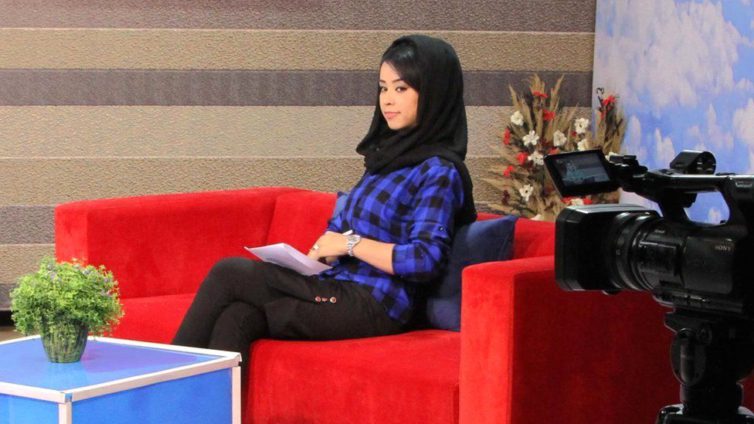Women have been banned from appearing in television dramas in Afghanistan under new rules imposed by the Taliban government.
Female journalists and presenters have also been ordered to wear headscarves on screen, although the guidelines do not say which type of covering to use.
Reporters say some of the rules are vague and subject to interpretation.
The Taliban seized power in Afghanistan in mid-August and many fear they are gradually imposing harsh restrictions.
The militant Islamist group, which took control following the departure of US and allied forces, almost immediately instructed girls and young women to stay home from school.
During their previous rule in the 1990s, women were barred from education and the workplace.
The latest set of Taliban guidelines, which have been issued to Afghan television channels, features eight new rules.
They include the banning of films considered against the principles of Sharia - or Islamic - law and Afghan values, while footage of men exposing intimate parts of the body is prohibited.
Comedy and entertainment shows that insult religion or may be considered offensive to Afghans are also forbidden.
The Taliban has insisted that foreign films promoting foreign cultural values should not be broadcast.
Afghan television channels show mostly foreign dramas with lead female characters.
A member of an organisation that represents journalists in Afghanistan, Hujjatullah Mujaddedi, said the announcement of new restrictions was unexpected.
He told the BBC that some of the rules were not practical and that if implemented, broadcasters may be forced to close.
The Taliban's earlier decision to order girls and young women to stay home from school made Afghanistan the only country in the world to bar half its population from getting an education.
The mayor of the capital, Kabul, also told female municipal employees to stay home unless their jobs could not be filled by a man.
The Taliban claim that their restrictions on women working and girls studying are "temporary" and only in place to ensure all workplaces and learning environments are "safe" for them.
Latest Stories
-
US$ 232,960 alleged Cannabis: One more grabbed and remanded
22 minutes -
Video: Hitz FM’s Rep Ur Jersey ends in style as fans jam to afterparty beats
8 hours -
Hitz FM’s Rep Ur Jersey turns electric as PSG thrashes Inter 5–0 in Champions League showdown
8 hours -
PSG thrash Inter Milan to win first-ever Champions League title
8 hours -
Aviation Social Centre packed as UCL Finale kicks off at Hitz FM’s Rep Ur Jersey
10 hours -
Photos: Fans win big at ‘Rep Ur Jersey’ as sponsors reward game participants with exciting prizes
10 hours -
Australia to increase contribution to UN Peacebuilding Fund to $15m annually – High Commissioner
10 hours -
Dr. Angela Dwamena-Aboagye named MTN Hero of Change for championing women and children’s rights
10 hours -
From Morocco to Botswana – Africans turn to trusted media and experts for climate change information
11 hours -
Mahama announces Labour Export Programme
11 hours -
Prof. Peter Atudiwe Atupare appointed Dean of University of Ghana School of Law
11 hours -
Goldbod is already doing wonders – Mahama praises CEO Sammy Gyamfi
12 hours -
Mahama promises attractive cocoa price in August, pledges 200,000 hectare boost to sector
12 hours -
UHAS Council Chairman Prof. Kodzo Gavua urges graduates to serve with passion, integrity, and innovation
13 hours -
Dr. Charisa Ogbogbo becomes first female professor in Mathematical Sciences at UG
13 hours

